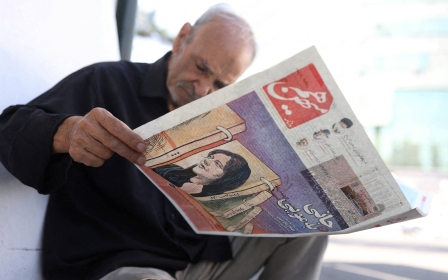Iranian press review: Male fans barred from football stadiums

Establishment orders female-only matches
The Iranian establishment, known for repeated bans on female fans attending men's football matches, made an unusual move by banning male spectators from matches between two local teams.
Last week, the disciplinary committee of the country’s football federation ruled that the Sepahan and Persepolis teams should play their matches against each other in the upcoming season without male spectators, allowing only female fans.
This ruling followed an incident during their last match between on 1 May, when some male fans in the stadium insulted a small group of women watching the game.
While some viewed this decision as another instance of gender discrimination, the majority of domestic media, which had previously protested against the exclusion of women from football stadiums in past years, welcomed it.
Stay informed with MEE's newsletters
Sign up to get the latest alerts, insights and analysis, starting with Turkey Unpacked
The Tabnak website said, "For many years, with male-dominated football stadiums in Iran, women have been sidelined. Now, with the disciplinary committee's decision, we will witness female-only stadiums, marking a significant shift in the status of women in Iranian society."
The Khabar sports daily described this decision as "breaking taboos", while simultaneously criticising the government's restrictive policies on women's presence in stadiums.
"Only two months ago, women were completely barred from attending football stadiums. Now, according to the federation's ruling, next year's [Iranian] El Clasico will be exclusively attended by female spectators," the daily said.
Iran and Egypt to rekindle relations amid regional unrest
Local media in Tehran have reported on the potential revival of relations between Iran and Egypt, alongside Tehran's efforts to strengthen ties with other regional nations affected by Israel's war in Gaza.
According to the country's official news agency, IRNA, officials from both countries have been working to improve their political and economic relations in recent months.
Iran cut ties with Egypt after the 1979 revolution because of Egypt's hosting of the last Shah of Iran. However, attempts to resume relations began in 2012 under Mohamed Morsi's presidency, only to be halted by the 2013 coup led by the then army general Abdel Fattah el-Sisi.
IRNA reported that foreign ministers from both nations held meetings to revive bilateral relations, with the presidents of Iran and Egypt also meeting directly on the sidelines of the Islamic Summit Conference earlier this month. Talks also involved parliamentary speakers and economy ministers from both countries.
The Arman Meli daily highlighted efforts by both countries to restore relations, as well as Iran's strategy to overcome political isolation in the Middle East.
The newspaper said: "Forging ties between Iran and Egypt is notably simpler compared to the complexities involved in rebuilding relations between Iran and Saudi Arabia,” in reference to the resumption of relations between Iran and Saudi Arabia in March 2023.
The paper also noted that the process of re-establishing relations between Iran and Egypt was interrupted following the outbreak of the war in Gaza because differences over the conflict. Nonetheless, Arman Meli emphasised that dialogue had begun to resolve these issues.
Iranian intellectual Zibakalam put behind bars
The imprisonment of Sadegh Zibakalam, a retired university professor, has sparked widespread condemnation over the restriction of freedom of expression.
Zibakalam, well known for criticising the establishment’s foreign policy, had faced numerous court summonses and trials in recent years because of his critical interviews but had never been imprisoned.
However, local media reported on Monday that Zibakalam was sentenced to three years in jail over convictions in three cases, in which he was found guilty of "propaganda activity against the regime" and "publishing undocumented and unreal content".

Khabar Online, which had interviewed Zibakalam a day before his arrest, reported the launch of his latest book at the Tehran International Book Fair titled "Why I Am Not Arrested" on the same day he was imprisoned. The book revolves around his memories after the 1979 revolution.
Explaining the title choice to Khabar Online, Zibakalam said: "Whenever someone sees me on the street, they ask why [the establishment] has not arrested me and what will happen next? So, I felt compelled to address these questions as best I could."
When asked specifically why he had not been arrested, he responded: "I'm not worth the effort. I'm not such a threat to the establishment that they'd want to arrest me."
In another part of the interview, he said: "The security officials know that if they call me and say ‘hey Mr. Zibakalam, do not write anything online from now on, don't go to Khabar Online and...,’ they know that I will accept it. So, when with a phone call you can silence a person, why should you put him in jail?"
*Iranian press review is a digest of news reports not independently verified as accurate by Middle East Eye.
Middle East Eye delivers independent and unrivalled coverage and analysis of the Middle East, North Africa and beyond. To learn more about republishing this content and the associated fees, please fill out this form. More about MEE can be found here.





